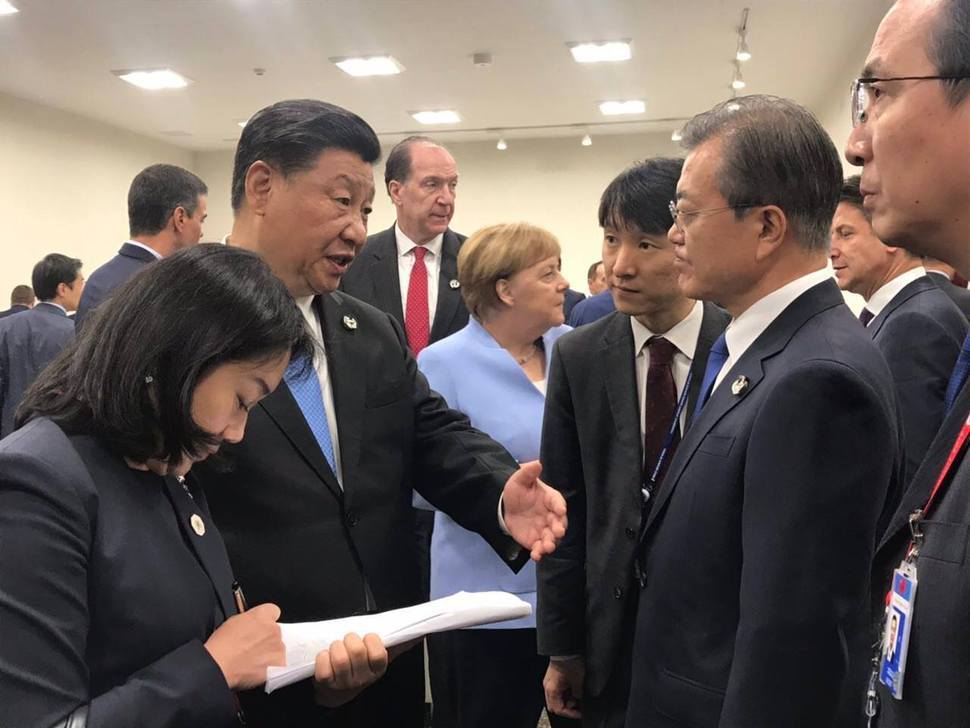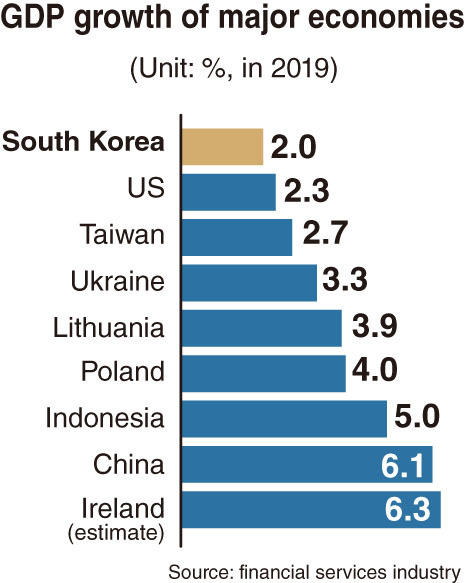[News Focus] Korea’s economy underperforms among emerging nations
By Kim Yon-sePublished : Feb. 9, 2020 - 15:34

SEJONG -- South Korea’s economy advanced only 2 percent in 2019, despite the government’s pump-priming measures coupled with the central bank’s monetary easing policies.
The figure stayed below the economic growth rates, posted by two of the world’s largest. The US and China marked 2.3 percent and 6.1 percent economic growth, respectively, last year.
Korea also lagged behind major emerging countries in Europe in GDP growth -- Poland (4 percent), Lithuania (3.9 percent) and Ukraine (3.3 percent).
Ireland -- whose population is less than 10 percent of that of Korea -- is estimated to have expanded 6.3 percent, according to its Finance Ministry.
In Asia, Indonesia -- a fast-growing economy and the fourth in population ranking -- recorded 5.02 percent. Taiwan also outstripped Korea with a 2.73 percent growth.
Among other countries, whose growth rate is estimated to have stayed above that of Korea, are New Zealand, Israel, Luxembourg, Slovenia, Hungary and the Czech Republic. They are members of the Organization for Economic Cooperation and Development, alongside Korea.

While Korea reported the lowest growth in a decade in 2019 since it stood at 0.8 percent in 2009, local and foreign analysts are also not upbeat about the nation’s economy this year.
J.P. Morgan, Barclays and Fitch Ratings have predicted 2.3 percent growth for Korea this year, while HSBC, Goldman Sachs and Credit Suisse forecast 2.2 percent.
Nomura and Moody’s Investors Service were more pessimistic, as both predicted 2.1 percent. Further, the outlook on the 2020 Korean economy from Citigroup and UBS stayed at 2 percent and 1.9 percent, respectively.
BofA Securities, the brokerage unit of Bank of America, expects the nation’s growth to further sag this year, with 1.6 percent growth rate.
The International Monetary Fund predicted 2.2 percent growth for Korea in its October outlook on major economies in 2020, while it suggested a 3.4 percent growth for the global economy on average.
The OECD and the Asian Development Bank have anticipated relatively high growth estimates of 2.3 percent and 2.4 percent, respectively.
Korea Investment & Securities and LG Economic Research Institute forecast a 1.8 percent expansion for this year.
LG Economic Research Institute said that “local manufacturers’ lackluster situation will continue this year as the international trade is dull, which could dent the semiconductor industry.”
The institute also commented on the decrease in working-age population, saying that the reduction will be faster, which would have a negative effect on private consumption domestically.
As for the government’s expansionary fiscal policy to reinvigorate the economy, the institute said, “Enterprises do not have capacity to increase salaries of employees (which would benefit consumption) as they are suffering declining profits,” it pointed out.
Hyundai Research Institute, in its report on economic issues at home and abroad, also forecast that the nation could see GDP growth fall below 2 percent this year.
It said that “a rebound in exports and investments could be restricted because both global and Korean manufacturing are sagging,” adding that the frozen sentiment in the real estate sector is another negative factor.
During the previous administration (2013-2016), Korea’s GDP growth ranged between 2.8 percent and 3.2 percent. Under incumbent President Moon Jae-in, the figure has continued to slide -- 3.2 percent in 2017, 2.7 percent in 2018 and 2 percent in 2019.
The nation’s sagging performance in exports since late 2018 has been a core negative factor for the economy. In January, outbound shipments fell 6.1 percent on-year, though the government was pinning hopes on a rebound during the first quarter.
Further, private consumption in the domestic market as well as exports is expected to plunge in the first quarter in the wake of the novel coronavirus from China.
The US dollar traded at 1,193.50 won on Friday, up 37.50 won compared to the last trading session of 2019, which would possibly undermine the purchasing power of Koreans.
By Kim Yon-se (kys@heraldcorp.com)
















![[KH Explains] Hyundai's full hybrid edge to pay off amid slow transition to pure EVs](http://res.heraldm.com/phpwas/restmb_idxmake.php?idx=652&simg=/content/image/2024/04/18/20240418050645_0.jpg&u=20240418181020)

![[Today’s K-pop] Zico drops snippet of collaboration with Jennie](http://res.heraldm.com/phpwas/restmb_idxmake.php?idx=642&simg=/content/image/2024/04/18/20240418050702_0.jpg&u=)